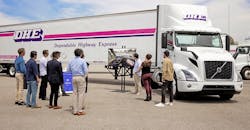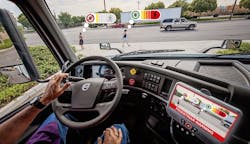Volvo Trucks, partners exploring human behavior prediction
Volvo Trucks North America, along with automated vehicle software provider Perceptive Automata and customer Dependable Highway Express (DHE), recently showcased a collaborative innovation project designed to strengthen safety capabilities for the trucking industry through automation.
This project leverages human intuition artificial intelligence that reads the intention and awareness of vulnerable road users such as pedestrians, cyclists and motorists to enhance the situational awareness of truck drivers, Volvo said.
Recognizing the critical need for improved safety for all road users, specifically to augment situational awareness and better anticipate human behavior while on the road, Volvo Trucks developed a proof-of-concept, together with Perceptive Automata and DHE, which it says recently was successfully demonstrated at DHE headquarters in Ontario CA. At the event, attendees experienced Perceptive Automata’s artificial intelligence (AI) software on a Volvo VNR 300 regional-haul model. Attendees also observed the AI in action during live drives.
“Safety is a core value at Volvo Trucks, and we continue to explore new and innovative ways to further enhance transportation safety, as well as improve driver support and comfort,” said Aravind Kailas, research and innovation manager at Volvo Group North America. “We are very proud of the collaboration with Perceptive Automata and DHE, who share our vision for increasing safety and have worked diligently over the last six to eight months to bring this project to life.”
Perceptive Automata is focusing on solving one of the most challenging problems for automated vehicles—understanding the state of mind of humans in our road environment. Its AI software ingests data from on-vehicle sensors and, like humans, assesses in real-time the likely intention and awareness of pedestrians, cyclists and other drivers by reading visual cues such as eye contact, posture, physical orientation and head movements, Volvo said. Increased safety is achieved through continuous 360-degree monitoring of human road users near the truck and, when warranted, signaling to the truck driver and on-board automated systems increased risk based on changes in human intention. This helps to enable earlier preventive actions by the truck driver, supported by the truck’s automated systems, to reduce the likelihood of accidents and help modulate the amount and severity of braking and acceleration.
“Advanced automation in trucking is an important application of our human behavior prediction technology, and we are excited to team with Volvo Trucks and DHE to demonstrate its impact on trucking safety,” said Sid Misra, chief executive officer of Perceptive Automata. “Volvo Trucks’ culture of safety and DHE’s service excellence align with our vision for the future of automated trucking and advanced driver support, and this project showcased how automation technology can enhance the situational awareness of truck drivers to reduce cognitive load and driver fatigue, and, ultimately, save lives.”
Volvo said DHE was integral in the project, providing real-world data from its fleet operations to enable the customization of the AI software for this specific application, and successfully showcasing it at DHE’s Ontario site.
“DHE’s quest for excellence in all areas, especially safety, is obvious as we specify all our Volvo truck models with every safety feature available from its factory,” said Joe Finney, chief operating officer at DHE. “We are excited to play a part in the research and development of this automation technology and the positive impact it can have in keeping everyone safer on the roads of the world.”
“Automation and driver support enhancements that help predict and prevent potential incidents will be essential to improving road safety now and in the future,” Kailas said. “While we recognize highly automated processes progress gradually and over time, we have gained valuable information from this collaboration in a short period of time.”


